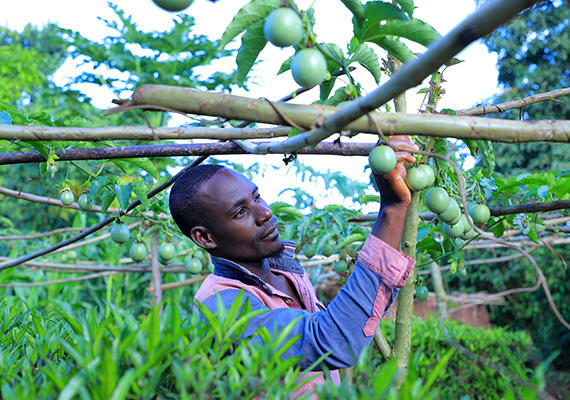
Tropical Dynasty does engage in-‐house production of Potatoes (20%), Hot peppers (10%) and Green chilies (20%), sourcing other fresh fruits and vegetables from small farmers in various locations in Uganda. The company has a tight relationship to with all suppliers who are closely supervised through 3 partnership models.
1. Through support partners, Tropical Dynasty has 630 farmers organized in groups of 20 youths each in average spread over Nakaseke, Mayugge, Baitambogwe, Bugiri, Busia, Namayingo, Tororo, Kibuku, Budaka, Namutumba, Butaleja, Manafwa and Namisindwa.
These are contracted and supervised by resident agricultural technical personel from Tropical Dynasty. They also receive technical, life skills and credit agricultural and safety inputs. They produce products such as Hot pepper, Bird eye chilli, white Garden eggs, Groundnuts and potatoes following
Good Agricultural Practices (GAP), food safety standards and other dynamic international market standards. We are also closely regulated by government ministry Trade & Agricultural experts, civil society partners, Sector Association Audits and internally regulated self-quarterly audits.
2. This second model addresses contracted partnerships with individual, strong, experienced, well established longstanding farmers. These form about 50 regulated lead growers who are interlinked with registered and monitored 5–15 out growers.
3. This third model relates to highly specialized green house and closed conventional growers who then supply Tropical Dynasty based on specific customer order requirements such as restricted quantities and content specifications.
4. This last model covers the factory distributor agencies and direct factory purchases on products such as spices and other processed packed foods.
Small Scale Farmer Support Scheme
Small farmers constitute one of the poorest and most vulnerable segments of the Ugandan society and this trade therefore offer great potentials in terms of accessing markets and ensure earning for the farmers involved. The impact of current trade is approximately impacting 1150 farmers in total and the overall social impact of the company’s operations affects at least 4000 rural livelihoods. Furthermore, farmers receive a comparably high pay for produced to the high quality requirements expected, which add to the value of the direct and indirect impact.
However, sourcing from small farmers is a massive bottle neck and restrains the company from reaching its potentials. This mainly relate to the lack of capabilities. As a result of poverty, farmers lack them ost basic economic means to ensure proper inputs and invest in the crops. This Furthermore, the farmers lack arrange of non-‐economic capabilities, such as education and access to knowledge and innovation, which then affect their farming methods, harvest and post-‐harvest management. Both the lack of economic and non-‐economic capabilities affects not only personal yield, but also the quality of their products. Thus it becomes a mutual problem and a disadvantage to both the company and the farmers.
The problems described above are particularly big in relation to the sourcing of chilli peppers, especially Habanero, and a main reason that Tropical Dynasty has not been able to expand its supply base. Chilli pepper farming demands high investments and good farm management. In particular, the origin of the plant is important both in terms of yield and quality. The biggest quality problems relates to size and taste and shelf life, which all causes major direct losses to Tropical Dynasty, and potential losses in terms of market barriers.
Tropical Dynasty has tried to accommodate this by building tight relationships, investing in training, and providing inputs. However, all of these initiatives have been informal and has given rise to opportunism. For instance, Tropical Dynasty has long experimented with handing out high quality seeds, but is seeds are often side sold making it a costly and ineffective operation.
